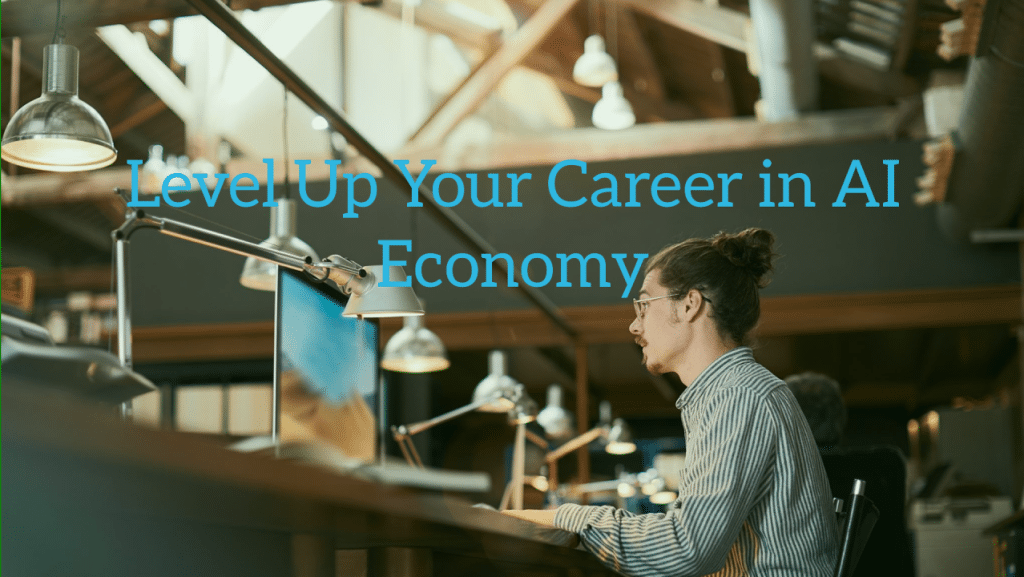Are you leveled up for the AI Economy?

I was inspired to reflect on the AI economy after reading a great articleby Joe McKendrick, a contributing writer at ZDnet. I have been passionate about writing about our need to learn new things daily in the new AI economy. This applies especially to the generation that had to do things in a more labor-intensive way (no pun intended, as I belong to that generation).
I have also written about my fears that the new generation entering the job market does not have to truly generate content from scratch, as we now have solutions available that do that for us, such as ChatGPT, Microsoft Copilot, and many others. I tend to think that I am a pretty advanced user of these AI technologies as it happens to be my role as an educator and consultant helping organizations become more efficient and envision solutions using AI technology. But how about the workforce that works in organizations with a leadership that doesn't believe in technological advancement and the education of their workforce? How are these professionals going to be able to compete in the future? Not well, I am afraid.
The article from ZDNet raises interesting questions that are worth pondering. It is based on a discussion of the evolving tech economy with Dr. (Economics of Technology Professor at Stanford Graduate School of Business), also the former chief economist for Microsoft.
Dr. Athey concludes, "It's hard to fully quantitatively capture the benefits of being more nimble and being able to add more features, do more projects, and experiment and innovate that you might not have otherwise done."She also concludes that the industry is finally seeing the payoff of many investments it has collectively made. The real question we need to pose is how technology professionals must rethink their roles and careers. Dr. Athey said her students probably write 80% of their code using Copilot. Copilot is good at finding syntax errors and writing tedious code. Knowing different programming languages is less important, but understanding higher-level architectural skills is becoming more important.
In other words, we still need to be able to evaluate what good looks like and have logical thinking capabilities. Dr. Athey says that students are great in training, optimizing, predicting, classifying, and comparing models A to B, but there is less training for students to ask hard questions such as "What does it mean? How would you know when or why it is doing well? What are the weaknesses? What kind of data would help improve it? It is the logical skills and things that we had to learn when crafting our own academic or scientific papers. Nothing was generated; every line or sentence had to be crafted from our head or referenced to other existing studies.
According to Dr. Athey, the main challenge is that "we don't have the science to know when it is giving you wrong answers and when it is giving you the right answers." What part of the potentially generated text is based on hallucination that is based on AI-driven content that was hallucinated in the first place?
This shows that executives and professionals must still be versed in logical thinking. This requires an understanding of statistics and conditional expectations. We need to be equipped with critical thinking capabilities and not believe everything GenAI feeds us.
GenAI tools are fantastic; they give us superpowers to be more effective in our work. However, they still require you to understand what you are asking them to do, what the output is, whether the output is based on logic, and whether it is a result of hallucination.
There are many opportunities within the growing AI era to dig into. My passion is and has been for a long time, what kind of impact AI will have on business models for end-user organizations and how software vendors should change their software pricing and packaging models, especially when infusing GenAI into their solutions. Software vendors can't use traditional SaaS pricing models in their solutions pricing but must consider the special characteristics of GenAI. I have written multiple articles on this and will continue doing so, both here in the LinkedIn newsletter and on the TELLUS blog. What I suggest you do is take your interest in AI and build a path to learn something new each week.
As an attorney, you must understand how the legal field will change with GenAI. If you are in the marketing field, you must understand what role marketing agencies and market functions within an organization will play. If you are within the education field, you need to know how education will change and how Gen Z expects to be educated, as they are the growing generation that will be a significant part of the workforce in the future.
The message to you is this: It is an exciting new era, and you should understand how to contribute to it and make a difference, whatever your profession.
I would love to hear your views on this topic. How are you participating in the new era of AI, and how do you plan to get educated in whatever profession you happen to be?
Yours,
Dr. Petri I. Salonen
PS. If you would like to get my business model in the AI Era newsletters to your inbox on a weekly or bi-weekly basis, you can subscribe to them here on LinkedIn https://www.linkedin.com/newsletters/business-models-in-the-ai-era-7165724425013673985/
